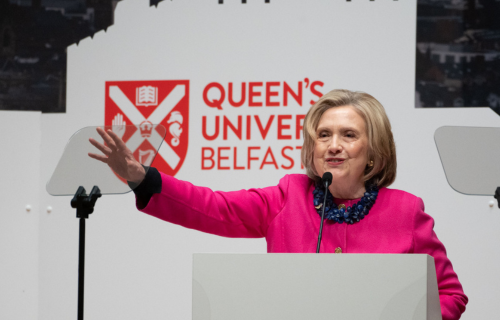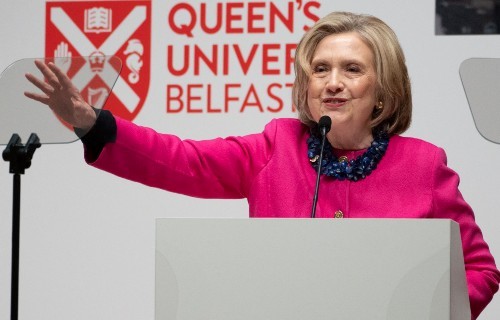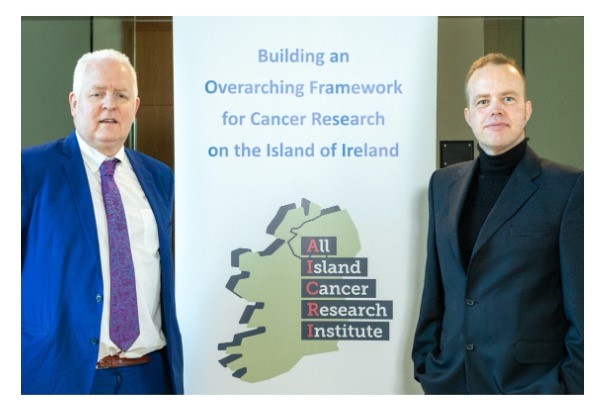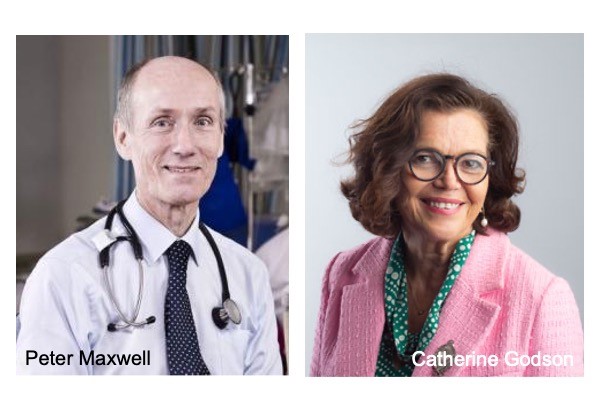Celebrating 25 years of research collaboration since Good Friday Agreement
Wednesday, 19 April, 2023
Share

This week, Queen’s University Belfast welcomed Higher Education delegates, including research partners from UCD, as they hosted former US Secretary of State and Senator Hillary Clinton for the 25th anniversary of the Good Friday Agreement (GFA) at their three-day conference (opens in a new window)Agreement 25.
The occasion marks decades of growing stability and cooperation on the island of Ireland across several areas of common interest including higher education, research and innovation. All-island collaboration between higher education institutions (HEIs), Government, industry, the public and civic society has positioned research and innovation as a keystone underpinning the all-island economy.

Last year, UCD and Queen’s signed their own historic agreement to strengthen collaboration between the two universities, to meet the shared challenges and opportunities of the 21st Century. The Memorandum of Understanding (MoU) builds on decades of collaboration, formalising a shared vision to enhance skills, develop and attract talent and drive research and innovation – enabling their student and staff populations and their communities to play a critical role in advancing society across the island of Ireland and beyond, economically, socially and culturally.
On the conference opening day, which was set around the theme of ‘reflection’, Hillary Clinton, who is chancellor of Queen’s, said: “On the 25th anniversary of the Good Friday Agreement, I think we can all agree to celebrate a significant milestone with both a sense of accomplishment but also of hope and determination that the next 25 years will bring more fully the peace, prosperity and safety the Agreement promised.”
She added: “One of the goals of this conference is to recognise the role that women have played and are playing in peace-building, and we’re also here to amplify the voices of the next generation of leaders, and to create a dialogue to address the major issues impacting society today.”
The GFA commemorations inspire reflection on the scholarship and research impact of the last 25 years, emanating from a rich history of cross-border collaboration in education, research and innovation, and achieved through bonds of cooperation and mutual support that truly echo the spirit of the GFA. The following list tells that story, including research that recognises the role of women in peace-building and some that is generated by emerging academic leaders on the island of Ireland.
The making of the All-Island Cancer Research Institute
A lesser known impact of the GFA is that the signing of the agreement played a central role in uniting cancer research efforts north and south of the border. Coming together over 20 years, with partners in the US, the parties formed the first all-Ireland cancer research institute, and their impact has been literally life-changing for cancer patients on the island.

In October 1999, pursuant to the GFA, a partnership was formed between the Departments of Health for Ireland and Northern Ireland and the US National Cancer Institute (NCI), giving rise to the Ireland-Northern Ireland-National Cancer Institute Cancer Consortium.
For two decades, the initiative was transformative for cancer researchers, leading to a doubling of collaborative cancer research on the island of Ireland, the creation of an all-island Cancer Atlas – published together by the cancer registries in Ireland and Northern Ireland –and paving the way for a number of significant partnerships with premier US cancer institutions.
Crucially, it saw over 35,000 cancer patients enrolled in clinical trials during the period, helping to save thousands of lives. While over 500 healthcare professionals and scientists were trained at the US National Cancer Institute, with many returning to enhance cancer research and its translation to better patient care on the island of Ireland.
The consortium's agreement was renewed in March 2021, coinciding with the launch of the Higher Education Authority North-South Research Programme that July, supported through the Shared Island Fund in the Office of An Taoiseach.
Led by Professor William Gallagher, UCD (pictured right), and Professor Mark Lawlor, Queen's, (pictured left) the cancer consortium parties founded the All-Island Cancer Research Institute (AICRI) and were funded through the first HEA call.
Professor of Cancer Biology at UCD and AICRI co-lead, William Gallagher said: “Our main goal within AICRI is to help cancer patients live longer and better after their diagnosis, by harnessing the various skills and expertise of our cancer research community and other stakeholders. While one-in-two people on this island are expected to be diagnosed with cancer at some point in their lifetime, research can change the goalposts in terms of earlier detection, improved treatment and survivorship. With this key initial funding, we can now embark on creating and embedding a fully integrated framework for cancer research on these shores.”
Read the (opens in a new window)full article on Irish Central by Professor William Gallagher and Professor Mark Lawlor.
Building Bridges Together: The US-Ireland Research & Development Programme
One of the institutions created by the GFA, the North-South Ministerial Council, brought together leaders from the Northern Irish and Irish governments to develop consultation and cooperation, especially on key areas of interest and importance. Although R&D was not expressly listed as an area of potential cooperation under the GFA, sectors including health, environment and agriculture were identified as priority areas for enhanced cross-border work, alongside boosting economic cooperation and opportunity and strengthening links with the US.

Stemming from that, the US-Ireland Research and Development Partnership was created and formally launched in 2006. It was a unique tripartite programme involving funding agencies in the US, Republic of Ireland and Northern Ireland, to increase the level of collaborative R&D between researchers and industry across the three regions in pursuit of valuable discoveries and innovations with commercial applications or that will translate to real-word impacts in health, disease prevention or healthcare.
To date, the programme has funded almost 100 projects between parties in the three jurisdictions, amounting to R&D funding capture of over €135 million (£121/$150m).
A cross-border group of researchers working towards a functional genomics pipeline for genetic discovery in diabetic kidney disease, led in UCD by Professor Catherine Godson (pictured right), director of UCD Diabetes Complications Research Centre, and in Queen’s by Professor Peter Maxwell of the Centre for Public Health (pictured left), received the first grant in 2008.
The group has since gained two further grants from the scheme, including a (opens in a new window)landmark award this March in partnership with Harvard Medical School and Massachusetts General Hospital in the US – and their work has been recognised as serving a major public health problem worldwide.
The project is co-funded by the Irish Health Research Board, Science Foundation Ireland, the National Science Foundation and National Institutes of Health in the USA, and the Department for the Economy (DfE) and the Health & Social Care R&D Division in Northern Ireland.
For the full UCD Research article, click here.